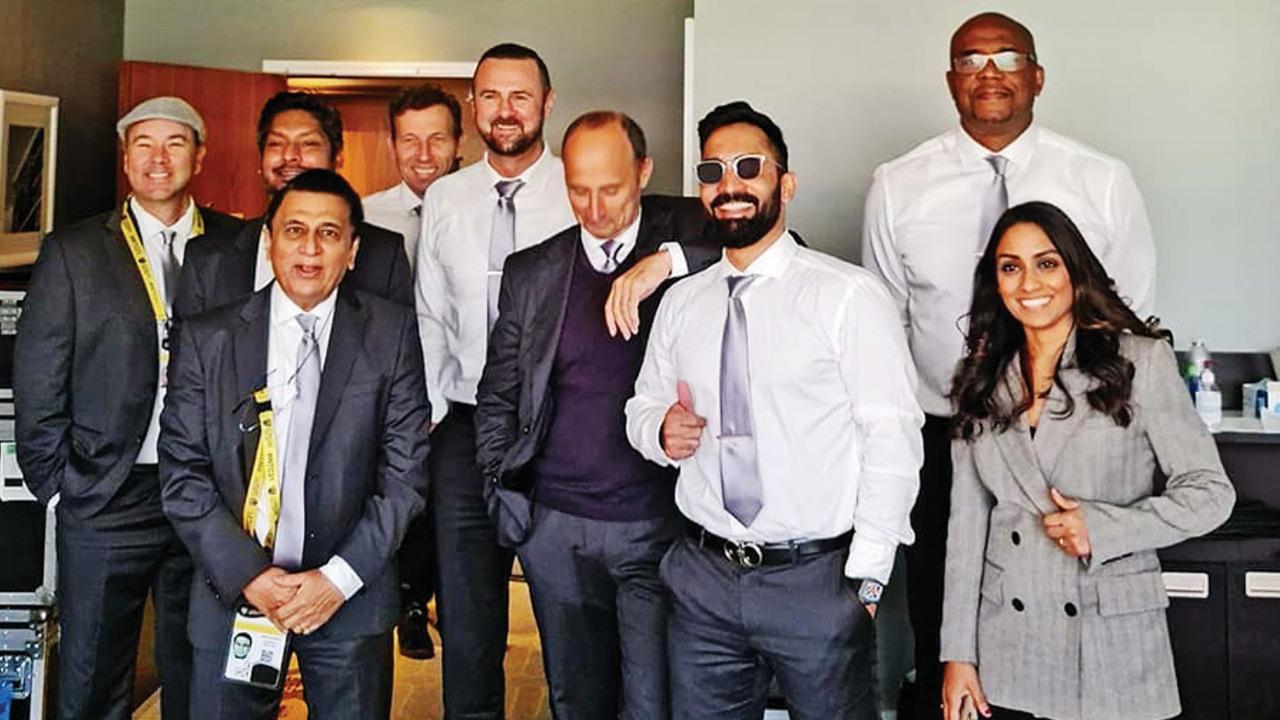Dinesh Karthik recently hit the ball out of the park as a first-time cricket commentator. Here, fellow cricketer-turned-commentator Aakash Chopra offers guidance to those who want to enter the box too

Dinesh Karthik (in sunglasses) shared this photo of himself with fellow commentators at the World Test Championship final. Pic/Instagram
It was a googly that stumped Nasser Hussain. When the Englishman was sharing the commentary box with debutante Dinesh Karthik at the recent World Test Championship final, he made an observation saying, “Rohit [Sharma] is a great puller of the short ball, uses his feet well against spin, and shows positive intent.” Karthik immediately shot back with, “Yes, exactly the opposite of you.” His tongue-in-cheek response — and indeed his entire stint during the match as a first-time commentator — won the Internet, with both experts and fans lauding his classy performance. But it’s not that Karthik didn’t lay the grounds for it. The wicket keeper-batsman prepared the pitch for his entry into the commentary box with mock drills, tutorials and conversations with former commentators, taking their critical feedback on board. It all helped him ease into the new role with the confidence of a batsman who’s facing a part-time bowler after just hitting a hundred.
ADVERTISEMENT
Aakash Chopra
Yet, no amount of homework can prepare you for what actually happens once you have the mic in your hand, feels Aakash Chopra, who, like Karthik, is also a cricketer-turned-commentator. “You may seek guidance from a few people and hold mock sessions in your drawing room, but it still won’t prepare you for the real thing. It’s like speaking to an army general about war — the battle will still have to be fought regardless of what he says,” Chopra tells us from Mumbai, adding, “There is another commentator next to you; sometimes, even two. Then there is a producer and a director in your ears who guide you with the broadcaster’s perspective. And there are of course the dynamics of the game itself. Imagine replicating all of that in your living room.”
A narrator’s role
There were a few preparations that Chopra himself made before starting his commentary stint in 2014. “I did a course in voice modulation, because I have a shrill voice. I would also talk really fast, so I learned to slow down. I realised that I had to understand the different roles and carve my own niche,” he says, explaining that commentators divide their roles as callers and experts. A caller, Chopra clarifies, is the sutradhar, the narrator who is creating a story with his conversations, holding the broadcast together. The expert’s job is to react, and it’s imperative for the caller to ask him or her the right questions. “It’s like when you speak for an interview. If you ask silly questions, you will get silly answers,” he tells us.
Prepare well
Doing your homework before the match starts is also of vital importance. “I learnt this really early on,” Chopra says, adding, “It was [Kumara] Sangakarra’s farewell game and the other commentator — I won’t name him — turned to me at one point and said, ‘It’s all yours.’ I wasn’t prepared. So, I missed the moment, because Sangakarra is never going to play another farewell game again. That’s when I realised that I will never be under-prepared again because if you aren’t going to give your best, then what’s the point?”
Ultimately, he continues, it really is about catching the moment. A commentator, he says, is in a position to create a theatrical spectacle. “You are a theatre artiste in that sense because imagine that it is a final match, it’s the last ball, and [Virat] Kohli is one run shy of 200. These are your moments and you can enhance them by adding a lot of drama to it. It’s not like the written word, which you can go back to and change later on. You have to do justice to that little 40-second piece you are creating. It gives you a lot of pleasure, but there is also a lot of pressure. If you don’t call a boundary properly, it’s done,” Chopra says, adding that it isn’t necessary that only former cricketers can become commentators.
He says, “Harsha [Bhogle] is a great example of that. A non-cricketer can play the role of the caller. Even when I am in the box, there might be someone I am speaking to who has played 100 Test matches, when I have played only 10. So, I am effectively the non-cricketer in that situation.”
 Subscribe today by clicking the link and stay updated with the latest news!" Click here!
Subscribe today by clicking the link and stay updated with the latest news!" Click here!











